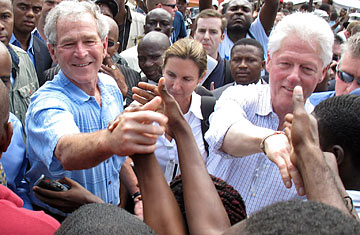
Former Presidents George W. Bush and Bill Clinton shake hands with earthquake survivors during a visit to Champ de Mars near the national palace in Port-au-Prince on March 22, 2010
Haiti's earthquake-shattered Presidential Palace seemed a fitting, if not historically poignant, backdrop for former U.S. Presidents George W. Bush and Bill Clinton's first joint visit to Haiti. Both men played pivotal roles in the Caribbean nation's crumbling politics and economy. Clinton returned democratically elected Jean-Bertrand Aristide to power in 1994 after a military coup had ousted him; a decade later, the Bush Administration flew Aristide out of Haiti and into exile.
Still, homeless earthquake survivor Joanne St. Leger, 30, is happy to see both Clinton and Bush in Haiti and trusts they will help make a difference. "We wouldn't find anything if it wasn't for foreigners," says St. Leger. "We've been here for three months outside this Presidential Palace, and [Haitian President René] Préval has never come to see us."
St. Leger says she would take any honest work, like sweeping the streets, to support herself and her 6-year-old daughter. And securing jobs for the hundreds of thousands of unemployed is a long-term goal for the Clinton Bush Haiti Fund. But St. Leger is skeptical when asked about the estimated $2.2 billion reportedly spent in postearthquake Haiti — with about $780 million spent by USAID and Department of Defense humanitarian aid. "If they've spent billions of dollars," she says, "I haven't seen it. We are living here day to day. We are bathing in dirt when it rains."
Severe rains have already hit Port-au-Prince, foreshadowing the coming rainy season. St. Leger says her compact shanty gets flooded with water up to her ankles and that one night she was forced to crouch in higher but smaller shelter all night until the rain stopped the next morning. Sloped land and sewage drains clogged with trash cause most of the flooding during heavy rains, creating an unsanitary environment that elevates concerns about the spread of disease.
Clinton acknowledged "mistakes" in the past, specifically related to the economic development of Haiti. "When I restored the democratically elected President of Haiti, I also signed legislation which essentially increased the penetration into Haiti of American rice and reduced Haiti's own rice production. I think it was a mistake." But the main focus of the former Presidents was not the past but the present. President Barack Obama appointed both Clinton and Bush to spearhead U.S. fundraising efforts for Haiti.
As they toured campsites outside the Presidential Palace, Haitian citizens and foreign and local journalists swarmed the formers heads of state while Secret Service agents and Haitian police attempted to create a perimeter. In the midst of the frenzy, Clinton looked around and asked, "Where's President Préval?"
The Haitian President was found greeting a group of women outside shanties made of tarp and plywood. The former Presidents soon followed, and Bush dove in to greet Gertrude Auguste, 31, with a kiss on her cheek. Auguste says they asked her about her living conditions in her impoverished camp at Champ de Mars, where an estimated 60,000 homeless earthquake survivors have settled. "We would like to move out of here, but not to someplace too far away. We want to be close enough to the center of the city," Auguste says.
New resettlement areas on the outskirts of the city have already been located, but without jobs, many of the residents say they will not leave their tent cities. Markendie Paul, 26, leans against the aluminum siding of a shanty with a group of friends. This is how he spends his day, just joking around with friends, but he says he would love to leave Port-au-Prince if he could find work. "Look, we are grown men with beards, and I'm asking my mother for a little money to buy coffee in the morning," says Paul. "I would like to find work to be the one to help my family."
Clinton said foreign investors, specifically from South Korea and Brazil, have already shown interest in establishing garment factories in Haiti if there are changes made to the HOPE (Hemispheric Opportunity through Partnership Encouragement) Act, which allows Haiti to export textiles tariff-free to the U.S. "I think it will create more than 100,000 jobs in Haiti in short order," said Clinton.
